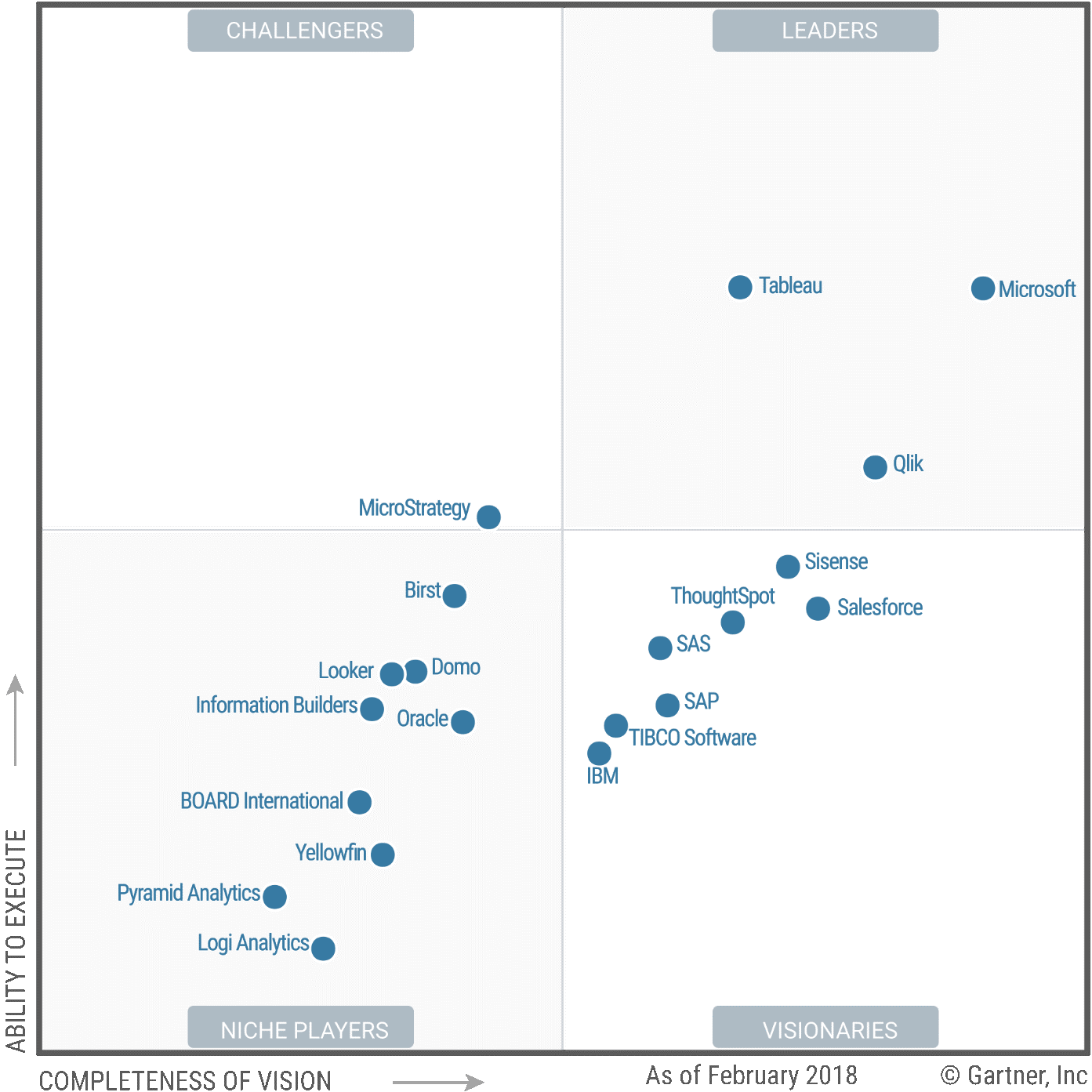- Vilius, how can insurance companies use Big Data technology?
- Companies should initially have a planning and reporting system. It covers the data bank, analytical tools and reporting tools. There are several companies that offer the necessary software. One of the good ways to look at suppliers is to use the Gartner Magic Quadrant for Analytics and Business Intelligence (see photo).
As you can see from this picture, the best product is provided by Microsoft.
Big Data is used to better understand customers, their behavior and preferences. Companies are seeking to expand their customer bases with social networking, browser logs, and text analytics and sensor data to get a more detailed picture of their customers. The main goal, in many cases, is to create prognostic models.
In general, there are several examples in the practical use of Big Data:
- Health insurance 1. Insurers make discounts (or extra charges) for certain health insurance products if a person leads a healthy lifestyle. By "healthy lifestyle" is meant exercise, striving for an optimal body mass index, smoking restrictions, a good balance between sleep, rest and work. This information is collected using sensors, which should be worn by users. Such products, for example, are available in Scandinavia, and are also started being used in Estonia.
- Health insurance 2. Assistance to nursing staff: using the sensor, it is possible to evaluate the patient's standard activity and monitor deviations from the norms. The patient also can call for help using such devices. It can also inform if the patient is outside the specified territory (https://www.vivago.com/solutions/assisted-living/).
- Health and accident insurance abroad. When a person leaves for another country, he is sent an offer of insurance abroad (risks, price per day). He can insure himself automatically. So, in Lithuania such a new sales channel is already operating.
- CNC insurance or Mandatory Insurance of Civil Liability of Motor Vehicle Owners. In each car, a sensor that records the data on the engine, driving (speed, turns, braking, work-rest mode), fuel use, car location and so on, can be installed. In new vehicles, all sensors are already integrated. The data is collected on the servers of manufacturers or companies that offer telematics services. This data is sent to the database every 5-15 seconds.
The information can be standardized and used to describe the driver profile. The profile shows the risk of the insurance event. Management can take the necessary measures to reduce the risk of driving and number of insurance events (and this affects the insurance coverage).
- CNC insurance. The device can inform the owner at the moment of theft/break-in.
Microsoft products (SQL Server + SharePoint) are used to extract, convert, and upload into analytical tools for visualizing data and reporting. Each company must have a database for business analysis and reporting in the beginning. Big data is what beyond the area of the current data bank.
Other Big Data features:
- Preparation of data: procedures for storing information in the database, structuring data for use;
- Data modeling (segmentation, profile creation, modeling and forecasting);
- Practical use: creating triggers for sales, marketing or discount procedures.
- Where is the ethical boundary in collecting data on different people, potential clients, from all possible sources? Thus, specialists, including in Russia, where this technology is already actively used, say about the lack of regulation of large data in general, as well as the lack of methodologies and standards for protecting Big Data. Different organizations publish their methodologies and recommendations, but none of them has reached the ISO level yet.
As it turns out; any competent IT specialist can mess up with people’s data in their profiles in social networks? Are there any constraining factors for that?
- In general, you are right. Any competent IT specialist can mess things up with people’s data in their profiles in social networks. It is not difficult, if you know how.
It is important to say that knowledge comes from general information. For conclusions, the amount of data is needed. There are many clients in social networks, but the question is how to win them after the last scandals on the leakage of personal data?
But for life insurers it is more important to obtain information about client’s health than social network data. More personal information is needed.
It is planned to introduce restrictions on the transfer of personal data to other companies in Europe. The consent of the client will play a big role. But in general, customers themselves will give data if the services can be used for free (or at a discount).
- Now in the West the scandal with data on 50 million American profiles on Facebook, collected by Cambridge Analitica Company in order to affect the results of elections in 2016 in the United States is actively discussed. Facebook has already announced the measures taken to protect user data in connection with this scandal. How would you comment on this case from the point of view of the Big Data ethical use?
- If this is true, then it is the best example of how you Big Data can be used. The idea is simple, to create an accurate customer profile and provide accurate information about the services. This is one of the most effective ways to contact customers. Very often advertising goes to wrong people, and spot advertising allows spend resources effectively in order to get customers.
Ethical principles are violated, because "useful" information is strongly recommended. This affects the individual's right to choose, the right to privacy and personal data protection.
- As of May 25 this year, the EU announced the General Data Protection Policy’s (GDPR) entry into force of in the countries of the European Union. For example, now every user, according to these rules, has the right to delete all the data accumulated about him, that is, to have the "right to be forgotten". And if his demand is not fulfilled within 72 hours, the providers may be fined 2% of their annual world income, or 10 million euros, whichever is greater. In case of illegal transfer of a person's data to another country or violation of the principles of processing user data, the data protection authority may impose a fine of 20 million euros. How would you comment on this event?
- This Regulation applies the approach to data protection of the 21st century. It extends the rights of certain people to control how their personal information is collected and processed, and also establishes a number of obligations for organizations.
This means that more attention should be paid to data protection. It is necessary to explain each connection to databases, and all actions are recorded. These procedures cause some bureaucracy, but in the future it will not be possible to work differently.
In short, here are the principles, directives that will soon come into force in Europe (The EU General Data Protection Regulation (GDPR):
• Servers with personal data must be in the country (or in the same economic space);
• Personal data cannot be transferred to other parties without the client's consent;
• Provide adequate security, integrity and confidentiality;
• Maintain a detailed record of all data processing operations. That is, record what is done with the data
• Implement appropriate measures to ensure personal data security;
• If necessary, assign a Data Protection Officer;
• Audit, how data is used.
In general, the situation is simple: those who own data from social networks and personal data from other databases can benefit both politically and economically. Perhaps, that is why Facebook, Google, LinkedIn do not work in China (they build analogues for their customers). Also, some programs have already stopped working in Russia.
Photo per website: golos.io







